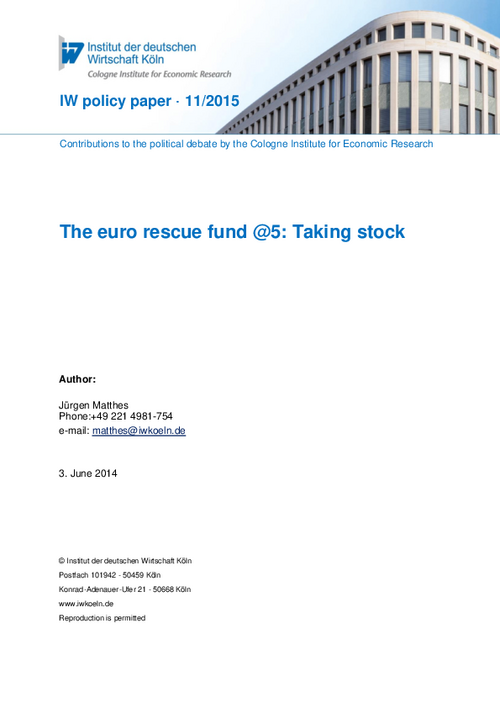Taking stock

The euro rescue fund @5
IW policy paper

Taking stock
On June 7, 2015, the euro rescue fund will celebrate its 5th anniversary. Thus, it is time to take stock regarding the success of the reform strategy, the institutional relevance of the ESM, and current political challenges to the conditionality principle which is an essential pillar of the reformed EMU institutional architecture. First, the rescue and reform strategy of the euro area is on the right track in Ireland, Spain and Portugal. While challenges remain particularly regarding public and private debt levels, all three countries successfully returned to the financial market after implementing a multitude of reforms. The Cologne Institute for Economic Research (IW Köln) analysed the economic progress made since the beginning of the crisis – with the following results:
- Ireland performs best, closely followed by Spain and with Portugal coming third.
- Economic growth has returned and is particularly buoyant in Ireland and Spain.
- Remarkably, domestic demand is also growing relatively rapidly despite the fact that private debt levels are still elevated and deleveraging is ongoing.
- Unemployment remains high (particularly in Spain), but is decreasing at a considerable pace.
- All three countries have turned their current account from deeply negative into positive digits. This success has been based on a surprisingly strong export performance.
Second, the euro rescue fund fills a gap in the institutional framework of EMU. The founding fathers of EMU had not sufficiently provided for the danger that even solvent member countries could be pushed into illiquidity and default by nervous financial markets. However, financial assistance can only be provided if the stressed country agrees to a reform program. This principle of conditionality is an essential pillar of the new EMU institutional framework. It is a recipe of success for implementing indispensable economic reforms and is required to prevent moral hazard problems.
Third, the principle of conditionality could be endangered by the initiative to integrate the ESM into the EU treaties and the community method and by a call for more political control of the Troika (now named the Institutions), which allegedly lacks democratic legitimacy. Both approaches would increase the political influence on the ESM and the Institutions and could lead to lamentable compromises due to vested political interests. To avoid a sell-out of the conditionality principle, more political independence and rule orientation are needed than the EU Commission or the European Parliament can provide. This is why the IMF and the ECB are required to keep their strong roles in the game.
In view of the two political initiatives:
- The integration of the ESM into the EU treaties appears reasonable at first sight. However, if indeed implemented it must be done without significantly changing the ESM’s decision making rules. Otherwise, the conditionality principle could suffer. Also, the grip of ESM members on its large finances could be loosened – which would lead to a severe conflict between the calls for democratic legitimacy at the EU and at the national level.
- The discussion about democratic legitimacy of the Institutions can be largely discarded. They only prepare and monitor reforms. Moreover, they are indirectly legitimized, because it is the democratically legitimized euro finance ministers and the national parliaments of the program countries that take the relevant decisions. The IMF’s structure with its decade long and mostly successful practice is a case in point.

Jürgen Matthes: The euro rescue fund @5 – Taking stock
IW policy paper


Inflation in der Eurozone: Der Weg bleibt holprig
Die Inflation in der Eurozone befindet sich auf dem Rückzug. Ein Aufatmen wäre aber verfrüht. Zweitrundeneffekte im Arbeitsmarkt sind im vollen Gange und setzen die Geldpolitik weiter unter Druck.
IW
Trump oder Harris oder …? Worauf sich Europa einstellen muss
Wenige Monate vor der Präsidentschaftswahl in den USA hat Donald Trump gute Chancen auf eine Wiederwahl. Auf Seiten der Demokraten hat der amtierende Präsident seine Kandidatur nach langem Zögern zurückgezogen, Vizepräsidentin Kamala Harris wird mit hoher ...
IW